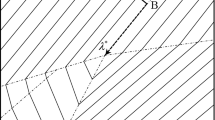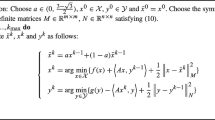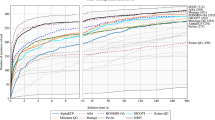Abstract
We propose a hierarchy of semidefinite programming (SDP) relaxations for polynomial optimization with sparse patterns over unbounded feasible sets. The convergence of the proposed SDP hierarchy is established for a class of polynomial optimization problems. This is done by employing known sums-of-squares sparsity techniques of Kojima and Muramatsu Comput Optim Appl 42(1):31–41, (2009) and Lasserre SIAM J Optim 17:822–843, (2006) together with a representation theorem for polynomials over unbounded sets obtained recently in Jeyakumar et al. J Optim Theory Appl 163(3):707–718, (2014). We demonstrate that the proposed sparse SDP hierarchy can solve some classes of large scale polynomial optimization problems with unbounded feasible sets using the polynomial optimization solver SparsePOP developed by Waki et al. ACM Trans Math Softw 35:15 (2008).
Similar content being viewed by others
References
Andersen, M., Vandenberghe, L., Dahl, J.: Linear matrix inequalities with chordal sparsity patterns and applications to robust quadratic optimization. In: Proceedings of IEEE International Symposium on Computer-Aided Control System Design (CACSD) (2010)
Bruckstein, A.M., Donoho, D.L., Elad, M.: From sparse solutions of systems of equations to sparse modeling of signals and images. SIAM Rev. 51(1), 34–81 (2009)
Candés, E.J., Tao, T.: Decoding by linear programming. IEEE Trans. Inf. Theory 51, 4203–4215 (2005)
Candés, E.J., Wakin, M.B., Boyd, S.: Enhancing sparsity by re-weighted \(l_1\) minimization. J. Fourier Anal. Appl. 14(5), 877–905 (2008)
Demmel, J., Nie, J.W.: Sparse SOS relaxations for minimizing functions that are summations of small polynomials. SIAM J. Optim. 19(4), 1534–1558 (2008)
Feng, M., Mitchell, J.E., Pang, J.S., Shen, X., Wachter, A.: Complementarity formulations of \(l_0\)-norm optimization problems. http://www.optimization-online.org/DB_HTML/2013/09/4053.html
Feng, C., Lagoa, C., Sznaier, M.: Hybrid system identification via sparse polynomial optimization. In: American Control Conference (ACC), pp. 160–165 (2010)
Fukuda, M., Kojima, M., Murota, K., Nakata, K.: Exploiting sparsity in semidefinite programming via matrix completion I: general framework. SIAM J. Optim. 11, 647–674 (2000)
Ghaddar, B., Marecek, J., Mevissen, M.: Optimal power flow as a polynomial optimization problem. IEEE Trans. Power Syst. 99, 1–8 (2015)
Hà, H.V., Phạm, T.S.: Representations of positive polynomials and optimization on noncompact semi-algebraic sets. SIAM J. Optim. 20, 3082–3103 (2010)
Jeyakumar, V., Lasserre, J.B., Li, G.: On polynomial optimization over non-compact semi-algebraic sets. J. Optim. Theory Appl. 163(3), 707–718 (2014)
Jeyakumar, V., Li, G., Pham, T.S.: Convergence of the Lasserre hierarchy of SDP relaxations for convex polynomial programs without compactness. Oper. Res. Lett. 42, 34–40 (2014)
Jeyakumar, V., Li, G.: A new class of alternative theorems for SOS-convex inequalities and robust optimization. Appl. Anal. 94, 56–74 (2015)
Jeyakumar, V., Li, G.: Exact SDP relaxations for classes of nonlinear semidefinite programming problems. Oper. Res. Lett. 40, 529–536 (2012)
Kleniati, P., Parpas, P., Rustem, B.: Partitioning procedure for polynomial optimization. J. Glob. Optim. 48, 549–567 (2010)
Kim, S., Kojima, M., Mevissen, M., Yamashita, M.: Exploiting sparsity in linear and nonlinear matrix inequalities via positive semidefinite matrix completion. Math. Program. 129, 33–68 (2011)
Kim, S., Kojima, M., Waki, H., Yamashita, M.: Algorithm 920: SFSDP: a sparse version of full semidefinite programming relaxation for sensor network localization problems. ACM Trans. Math. Softw. 38, 1–19 (2012)
Kojima, M., Muramatsu, M.: A note on sparse SOS and SDP relaxations for polynomial optimization problems over symmetric cones. Comput. Optim. Appl. 42(1), 31–41 (2009)
Lasserre, J.B.: Global optimization with polynomials and the problem of moments. SIAM J. Optim. 11, 796–817 (2001)
Lasserre, J.B.: Moments, Positive Polynomials and Their Applications. Imperial College Press, London (2009)
Lasserre, J.B.: Convergent SDP-relaxations in polynomial optimization with sparsity. SIAM J. Optim. 17, 822–843 (2006)
Lu, W.-S., Hinamoto, T.: Design of FIR filters with discrete coefficients via polynomial programming: towards the global solution. In: IEEE International Symposium on Circuit and Systems, pp. 2048–2051 (2007)
Luo, Z.-Q., Sidiropoulos, N.D., Tseng, P., Zhang, S.: Approximation bounds for quadratic optimization with homogeneous quadratic constraints. SIAM J. Optim. 18, 1–28 (2007)
Marshall, M.: Positive Polynomials and Sums of Squares, Mathematical Surveys and Monographs, vol. 146. American Mathematical Society, Providence (2008)
Nie, J.W.: Sum of squares method for sensor network localization. Comput. Optim. Appl. 43(2), 151–179 (2009)
Nie, J.W.: An exact Jacobian SDP relaxation for polynomial optimization. Math. Program. 137(1–2), 225–255 (2013)
Nie, J.: Optimality conditions and finite convergence of Lasserre’s hierarchy. Math. Program. 146, 97–121 (2014)
Parrilo, P.A.: Structured semidefinite programs and semi-algebraic geometry methods in robustness and optimization, Ph.D. thesis, California Institute of Technology (2000)
Putinar, M.: Positive polynomials on compact semi-algebraic sets. Indiana Univ. Math. J. 41, 49–95 (1993)
Scheiderer, C.: Sums of squares on real algebraic curves. Math. Z. 245, 725–760 (2003)
Schmüdgen, K.: The K-moment problem for compact semi-algebraic sets. Math. Ann. 289, 203–206 (1991)
Schweighofer, M.: Global optimization of polynomials using gradient tentacles and sums of squares. SIAM J. Optim. 17, 920–942 (2006)
Simon, F., Holger, R.: A Mathematical Introduction to Compressive Sensing, Applied and Numerical Harmonic Analysis, Chapter 15. Birkhauser/Springer, New York (2013)
Strum, J.F.: SeDuMi 1.02, a MATLAB toolbox for optimization over symmetric cones. Optim. Methods Softw. 11—-12, 625–653 (1999)
Vandenberghe, L., Andersen, M.: Chordal graphs and semidefinite optimization. Found. Trends Optim. 1, 241–433 (2014)
Waki, H., Kim, S., Kojima, M., Muramatsu, M.: Sums of squares and semidefinite programming relaxations for polynomial optimization problems with structured sparsity. SIAM J. Optim. 17, 218–242 (2006)
Waki, H., Kim, S., Kojima, M., Muramtasu, M., Sugimoto, H.: Algorithm 883: SparsePOP: a sparse semidefinite programming relaxation of polynomial optimization problems. ACM Trans. Math. Softw. 35, 15 (2008)
Author information
Authors and Affiliations
Corresponding author
Additional information
The first and the fourth author were partially supported by a Grant from Australian Research Council. The second author was supported by NRF 2012-R1A1A2-038982 and NRF 2014-R1A2A1A11049618. The third author was supported by Basic Science Research Program through the National Research Foundation of Korea (NRF) funded by the Ministry of Education (NRF-2013R1A1A2005378).
Appendix
Appendix
The polynomial optimization problem \((P_0)\) has a close relationship with the problem of finding the solution with the least number of nonzero components which satisfies a system of polynomial inequalities and simple bounds. Mathematically, the problem of finding the solution with the least number of nonzero components which satisfies a system of polynomial inequalities and simple bounds, can be formulated as

where \(n_l \in \mathbb {N}\), \(l=1,\ldots ,q\), and \(\Vert x\Vert _0\) denotes the \(l_0\)-seminorm of the vector \(x \in \mathbb {R}^n\), which gives the number of nonzero components of the vector x.
In the case where \(q=1\), \(I_1=\{1,\ldots ,n\}\), \(g_j(x)=a_j^Tx-b_j\), \(j=1,\ldots ,m\), \(g_{j}(x)=-(a_j^Tx-b_j)\), \(j=m+1,\ldots ,2m\), the problem \((P_0')\) collapses to the sparse optimization problem which finds the solution with the least number of nonzero components satisfying simple bounds as well as linear equations \(Ax=b\) with more unknowns than equalities:

where \(A=(a_1,\ldots ,a_m)^T \in \mathbb {R}^{m \times n}\) \((m \le n)\), \(b=(b_1,\ldots ,b_m)^T \in \mathbb {R}^m\). We note that the standard sparse optimization problem which is given by

arises in signal processing and was examined, for example, [2–4, 33]. Moreover, problems \((P_1)\) and \((P_2)\) have the same optimal value if \(M> \Vert x^*\Vert _2^2\) for some solution \(x^*\) of problem \((P_2)\).
In fact, the problem \((P_0)\) and problem \((P_0')\) are equivalent in the sense that \(\min (P_0)=\min (P_0')\) and \((x^{1*}, \ldots , x^{q*})\in \mathbb {R}^{n_1} \times \cdots \times \mathbb {R}^{n_q}\) is a solution of problem \((P_0)\) if and only if \((x^{l*},w^{l*}) \in \mathbb {R}^{n_l} \times \mathbb {R}^{n_l}\), \(l=1,\ldots ,q\), is a solution of problem \((P_0')\) where \(w^{l*}=(w^{l*}_{i_1},\ldots ,w^{l*}_{i_{n_l}}) \in \mathbb {R}^{n_l}\) is defined by
Rights and permissions
About this article
Cite this article
Jeyakumar, V., Kim, S., Lee, G.M. et al. Semidefinite programming relaxation methods for global optimization problems with sparse polynomials and unbounded semialgebraic feasible sets. J Glob Optim 65, 175–190 (2016). https://doi.org/10.1007/s10898-015-0356-6
Received:
Accepted:
Published:
Issue Date:
DOI: https://doi.org/10.1007/s10898-015-0356-6




